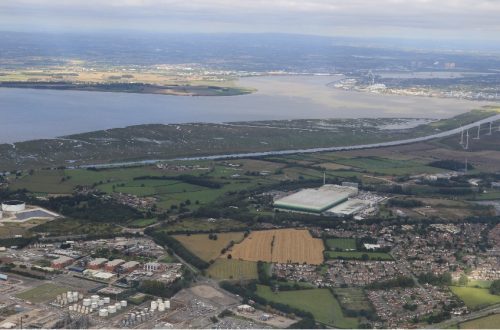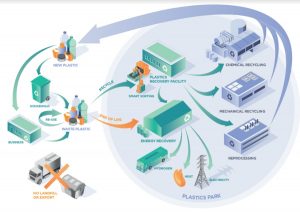Peel Environmental calls for £7.5bn investment to tackle plastic waste

Waste and infrastructure business Peel Environmental – part of Peel L&P – says the UK needs to invest more than £7.5bn in infrastructure to deal with plastic waste over the next 10 years.
The company has set out a vision for ‘plastic parks’ across the UK which would revolutionise the way that plastic waste is currently handled.
The parks would provide a complete solution for the 4.9 million tonnes of plastic waste generated in the UK each year, preventing it ending up in landfill, exported overseas or in the ocean.
With the first one planned for Peel Environmental’s Protos site in Cheshire, the plastic parks will deal with plastic waste where recycling has previously not been a viable option.
They will take plastic that’s at the end of its life, maximising what can be removed for recycling, with the remaining non-recyclable plastic used to create electricity, hydrogen or other products.
Working in partnership with Waste2Tricity, Peel Environmental has thrown its support behind pioneering waste plastic to hydrogen technology that is set to revolutionise the waste market, while kick-starting the emerging hydrogen economy in the UK.
The company has signed an exclusivity agreement to deploy the AIM-listed PowerHouse Energy Group technology in the UK. The first facility is set to be developed at Protos, as part of the first plastic park, having recently been granted planning consent.
Other technologies to feature at the parks will break plastic back into its component parts to reduce reliance on virgin fossil fuels.
With a network of parks envisaged across the UK, each one can be tailored to local needs, providing local councils with the comfort that their plastic waste is being handled responsibly.
Myles Kitcher, Peel Environmental managing director, said: “Infrastructure for dealing with plastic waste has been piecemeal at best and there’s a huge problem with accountability.
“Local authorities and businesses often have no idea that their plastics are being exported overseas where it has more chance of finding its way into the ocean.
“It’s right that we should be having the debate about plastic, but we’re not going to rid it from society overnight. In many cases plastic will continue to be the most sustainable and cost-effective option, for example its many uses in the medical industry.
“Rather than demonising all plastics, we need to reduce and re-use what we can, recycle after that and then find better solutions for what’s left.
“The technologies we’re looking at will provide solutions for plastics that, up until now, haven’t had a value. But we fully expect them to be transitional technologies which, in the short, term make a positive difference until we can reduce our plastic consumption.”
Currently there are only a handful of local councils that can take all plastics for recycling, with multiple collection regimes causing confusion among householders.
Even materials that are easily recyclable, such as trays made from polypropylene, are often not recycled as not all councils have access to the right facilities.
Mr Kitcher said: “Kerbside recycling systems are confusing at best, with many plastic products still ending up in the black bin and sent to landfill. The plastic parks will offer a simple solution for local councils.
“We can take any type of plastic, whether it’s been mixed or separated, and we’ll have a one-stop-shop for maximising recycling and creating value from what’s left.
“We see a network of plastic parks across the UK where the technologies can be tailored to local needs.
“The really exciting part is that this can happen quickly and it is a simple and cost-effective solution. Householders can put everything in one bin and be safe in the knowledge that the plastic is either going to be recycled or used to create energy, fuels or other products.”

A graphic explaining plastic parks
Chairman of Waste2Tricity, Tim Yeo, said: “We are proud to be an integral part of Peel’s visionary ‘plastic parks’, delivering an innovative solution to the plastic problem we face here in the UK.
“Not only will PowerHouse Energy’s pioneering DMG (Distributed Modular Generation) technology provide an innovative solution to the plastic problem faced here in the UK, but it will be producing low-cost hydrogen – a fuel of the future and one which many are recognising as being vital to getting to net zero emissions.”
The plastics parks concept is part of Peel L&P’s wider sustainability commitments and contribution to net zero emissions in the UK.
As part of a five-year sustainability plan, the company has committed to identifying unnecessary single-use plastics across the business and replacing them with more sustainable alternatives.
Additional targets include zero waste to landfill, a 20% increase in recycled waste, 20% reduction in water use, and a 15% reduction in energy use.
It was also recently announced that Peel L&P is the first property company to achieve net zero carbon status for 11 offices using the UK Green Building Council’s 2019 definition for buildings in the UK.








